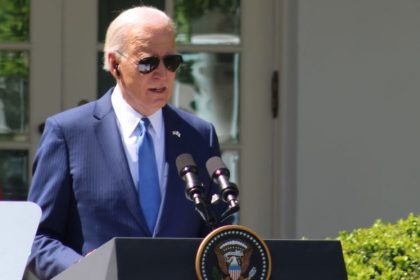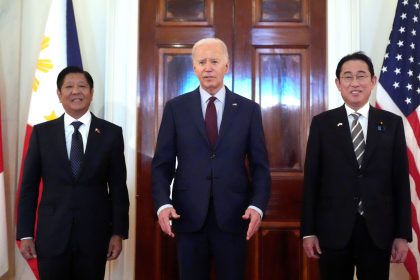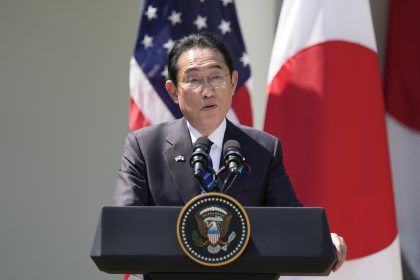Biden Orders Restrictions on Trade With China in National Security Move

WASHINGTON — President Joe Biden signed an executive order Wednesday restricting American investments and exports of expertise in high-tech technologies China is developing that could be used for its military modernization.
The order targets investment in semiconductors and microelectronics, quantum computing and some artificial intelligence.
Biden said they could pose a threat to national security as China makes more war rumblings over its claims to U.S. ally Taiwan.
The executive order says certain American investments might contribute to “the development of sensitive technologies and products in countries that develop them to counter United States and allied capabilities.”
“I find that countries of concern are engaged in comprehensive, long-term strategies that direct, facilitate or otherwise support advancements in sensitive technologies and products that are critical to such countries’ military, intelligence, surveillance or cyber-enabled capabilities,” the order added.
The order is planned to be implemented by the U.S. Treasury Department through export control regulations.
The regulations would ban U.S. citizens from transactions with China involving specified electronic equipment and computer software. It also would require them to notify the Treasury Department of other transactions that might pose a national security risk.
“The United States benefits from an open investment climate and this new program will not change that,” the Treasury Department said in a statement. “It is narrowly targeted at investments in highly sensitive technologies and products for the purposes of protecting U.S. national security.”
Some transactions, such as technology transfers between parent companies and subsidiaries, would get exceptions from the rules, the Treasury Department reported.
Biden’s executive order is essentially the same as recent bills in Congress to restrict high-tech business transactions with China.
One approved overwhelmingly by the Senate last month would require U.S. firms to notify the Treasury Department when their deals in China create national security concerns.
A second pending bill is the Restricting the Emergence of Security Threats that Risk Information and Communications Technology Act, S.686. It was introduced in March by six Republicans and six Democrats, giving it a strong likelihood of winning final approval.
The bill would grant the Commerce Department authority to review business transactions for information and communications technologies that pose an “undue and unacceptable risk” to national security.
Although it says it would apply only to business with a “foreign adversary,” discussions in Congress indicated it was directed at China, Cuba, Iran, North Korea, Russia and Venezuela.
The Chinese government responded by calling Biden’s executive order an attempt to politicize and weaponize trade between the world’s two largest economies. Chinese officials predicted the move would hurt U.S. international business as much as any other country.
“The economic and trade relationship between China and the U.S. is mutually beneficial in nature,” Chinese embassy spokesperson Liu Pengyu said in a statement responding to a Well News inquiry. “Two-way investment is an important area of bilateral trade. So far, there are more than 70,000 U.S. companies doing business in China.”
He ended with a veiled warning, saying, “China will closely follow the situation and firmly safeguard our rights and interests.”
The order received a more welcome response in the United States among lawmakers and industry groups.
Senate Majority Leader Chuck Schumer, D-N.Y., said, “Today the United States is taking a strategic first step to ensure American investment does not go to fund Chinese military advancement in developing and deploying cutting-edge capabilities that destabilize the region and threaten our national security.”
In addition to the national security concern, industry leaders say the executive order could help balance trade as they continue to accuse China of unfair trade practices in high-tech fields.
A Semiconductor Industry Association statement said, “We hope the final rules allow U.S. chip firms to compete on a level playing field and access key global markets, including China, to promote the long-term strength of the U.S. semiconductor industry and our ability to out-innovate global competitors.”
You can reach us at [email protected] and follow us on Facebook and Twitter
























